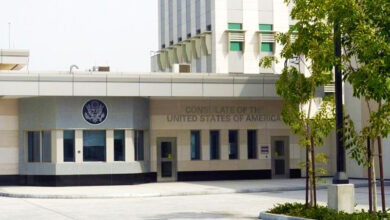Kuwait courts grapple with two forged document cases daily
Crimes related to forging educational, disability, and medical certificates, driving licenses, health fitness certificates for expatriates, and other offenses have surged.
-
In 2023, there were 618 cases of forgery of official documents, all of which were referred to the judiciary
-
The overall increase in forgery crimes serves as an alarm bell, signaling the need for stricter measures against counterfeiters.
-
Forgery cases are expected to double this year due to recent government measures
-
The Ministry has received hundreds of reports regarding fraud and dual nationality cases since announcing the hotline for report submissions
As the government intensifies efforts against forgery crimes, particularly related to university certificates and citizenship, courts witness a surge in forgery cases.
An informed source revealed to Al-Qabas newspaper that in 2023, there were 618 cases of forgery of official documents, all of which were referred to the judiciary. This averages to “about two crimes every working day during official hours.”
Despite the stricter legal penalties, such as imprisonment for up to seven years, for those committing forgery in official documents, some individuals still find it easy to commit these crimes. They believe that the law won’t catch up with them or that their activities will be hard to uncover.
The source highlighted a significant increase in cases of nationality forgery before the courts recently. Additionally, there has been a surge in crimes related to forging educational certificates, disability certificates, medical certificates, driving licenses, health fitness certificates for expatriates, and other offenses.
Forgery crime rise sounds alarm
The source explained that these statistics pertain only to seized crimes, implying that there are still crimes yet to be detected. They highlighted that the overall increase in forgery crimes serves as an alarm bell, signaling the need for stricter measures against counterfeiters.
Recent statistics have revealed an increase in document tampering and forgery of official documents. The source expects that forgery cases will double this year due to the government’s recent measures, including the review of citizenship records, audit of educational certificates for state employees, and intensified efforts to combat all forms of forgery.
The source disclosed that there is intensive coordination between the Interior Ministry and the Public Prosecution to apprehend counterfeiters. They explained that some forgery crimes were committed years ago and were only recently discovered through thorough examination and scrutiny.
The source disclosed that numerous cases of nationality forgery have resulted in convictions. The most recent ruling by the Court of Cassation sentenced a Kuwaiti citizen to three years in prison for falsifying nationality records, including adding a Saudi individual as his son through manipulation and forgery, to fraudulently acquire Kuwaiti nationality.
The court also sentenced the second accused, referred to as ‘the fictitious son,’ to seven years in prison. He had been receiving a marriage loan and rent allowance for years, but the forgery was revealed through fingerprints.
No to forgery
The numbers and cases mentioned came from the courtrooms, coinciding with the government’s efforts to cleanse the citizenship file of tampering and forgery.
According to the Al-Qabas source, the number of nationalities recorded in the first two weeks of March this year exceeded 211.
The source revealed a group of “forgery and duplication” files currently under review by the Supreme Committee for Citizenship. These files are being scrutinized in preparation for decisions to withdraw them upon verifying suspicions against them.
The source explained that the withdrawal files are categorized as “counterfeiters, cheaters, and deceivers in obtaining citizenship,” as well as dual nationals who have other nationalities. They are given the option to renounce their other nationality or retain Kuwaiti citizenship.
Additionally, the files include Kuwaiti women who marry Kuwaitis solely to acquire Kuwaiti nationality and then divorce. These individuals are naturalized immediately, often through agreements to divorce before the marriage, which is considered a form of fraud and deception.
The source revealed that the Ministry of Interior has received hundreds of reports regarding fraud and dual nationality cases since announcing the hotline for report submissions. These reports are currently undergoing thorough study, research, and investigation to confirm their validity before submission to the Supreme Committee for decision-making.
Forgery among relatives
Some of the forgery cases brought to court stemmed from complaints between relatives. For instance, a wife filed a complaint against her husband, alleging that his academic certificate was forged. Siblings also filed complaints, stating that one of their brothers had been falsely registered as their sibling. In another case, a citizen lodged a complaint against his friend for transferring a vehicle into his name without his signature, constituting forgery. As a result, his friend was detained in custody.
Prominent forgery crime
One of the most notable forgery crimes related to nationality that appeared in court involved a confession by three sons, while in the courtroom, claiming that the person standing before them was their father. However, the father denied their statements, saying, ‘They are not my sons, and I do not know them.’












